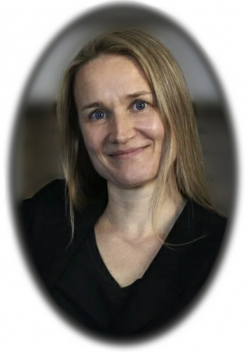Mari Ruti
1964-2023

Mari holds degrees from Brown (BA), Harvard (MA, PhD), and the University of Paris (DEA), where she studied with philosopher Julia Kristeva. At Harvard, Mari studied primarily under Alice Jardine and Barbara Johnson and worked as a full-time lecturer until being appointed to the University of Toronto as an Assistant Professor specializing in critical theory, psychoanalysis, continental philosophy, phenomenology, poststructuralism, and feminist and queer theory. Students flocked to fill her classes and work with her. Within a short period, Mari developed into one of the preeminent theorists of our time and was granted the position of Distinguished Professor. The number of students that Mari inspired and encouraged is immeasurable.
The act of writing brought Mari great joy and fulfillment. Her work particularly allows complicated concepts to become accessible and the most difficult thinkers to become approachable. Mari's work on notions of sublimation and desire emphasizes how upholding one's singularity through a creative act allows one to be true to one's authentic self and dispel the pressures of conformity coming from the social order. Her books are wildly popular, not just with scholars whose work ranges from queer antinormativity to ethics, but in communities of clinicians, analysts, artists, and creative writers who find transformative insights into the experiences of love, loss, hardship, and how to live an ethical, examined, and meaningful life. Her many books include Reinventing the Soul: Posthumanist Theory and Psychic Life (Other Press, 2006), A World of Fragile Things: Psychoanalysis and the Art of Living (SUNY Press, 2009), The Case for Falling in Love (Sourcebooks, 2011), The Singularity of Being: Lacan and the Immortal Within (Fordham University Press, 2012), The Call of Character: Living a Life Worth Living (Columbia University Press, 2013), Between Levinas and Lacan: Self, Other, Ethics (Bloomsbury, 2015), The Ethics of Opting Out: Queer Theory's Defiant Subjects (Columbia University Press, 2017), Penis Envy and Other Bad Feelings (Columbia University Press, 2018), and Distillations: Theory, Ethics, Affect (Bloomsbury, 2018). She has left behind a number of unpublished manuscripts that will appear posthumously.
In 2018, Mari received a breast cancer diagnosis. When, against her wishes, her breasts were not immediately removed, the cancer spread to other parts of her body. Mari consulted doctors from around the world in search of the best possible treatment for the cancer. This effort prolonged her life beyond the estimates of nearly every doctor. When she died, her cancer load was actually much lower than it had been previously, indicating the success of the treatment she pursued, but her lungs were irrevocably weakened. She died on the morning of June 8, 2023, in hospital near her home in Mahone Bay, Nova Scotia, Canada.
Mari is survived by her mother Ritva Ruti and her brother Marko Ruti. She is predeceased by her father Jukka Ruti. Mari will also be missed terribly by a large circle of friends, students, and colleagues all over the world who adore her. Relationships were of paramount importance to Mari, and she had a remarkable ability to attract kindred souls wherever she went, building community and family around her. She was especially adept at seeing and connecting with the children in her life.
Mari loved and celebrated being alive. A favorite running trail, a perfect spot for tea, the best hamachi nigiri in town, or the idyllic ocean-view perch from which to write-she had an ability to find and celebrate the special places around her. From her mother's sauna overlooking Myrajarvi lake in Finland to a banana grove in Hana, Maui HI, from Lunenburg NS to Woods Hole MA to Vancouver BC-she found places with which she connected, and she made them home. She found pleasure and beauty all around her, and she had a knack for truly relishing life. She thought deeply, wrote brilliantly, spoke honestly, loved earnestly, laughed easily, and lived with glorious vitality. And she never met a piece of chocolate she didn't like.
Mari approached her illness and treatment with tenacity and determination. She advocated for herself with ferocity, never losing her belief in herself or her instincts. To her last days Mari's courage, incandescent vibrancy, and intellectual rigor was matched only by her kind-heartedness. Mari lived by her theoretical ideals in that she faced the existential crisis of life and treated each new decision as a creative act."




